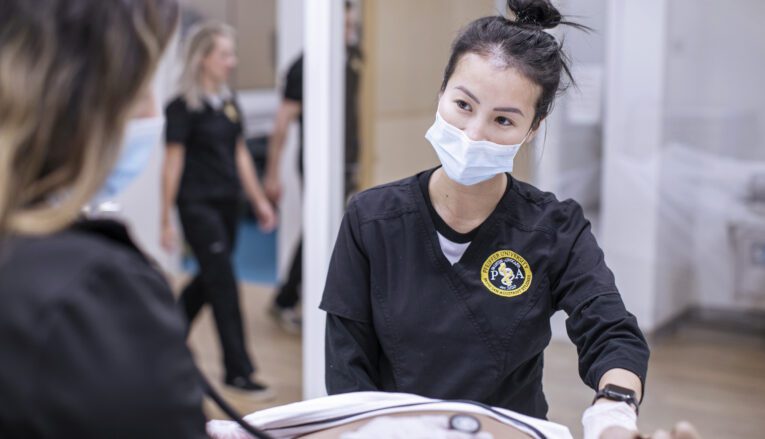

Didactic Phase = 71 SH
Clinical Anatomy and Introduction to Diagnostic Imaging (5 SH)
Medical Physiology (2 SH)
Essentials of Medical Genetics (1 SH)
The Physician Assistant: Introduction to Healthcare (1 SH)
Epidemiology and Biostatistics: An Introduction to Clinical Research (1 SH)
Public Health: Principles, Policy, and Advocacy (1 SH)
Pharmacotherapeutics I (2 SH)
Dermatology (1 SH)
Ophthalmology & ENT (2 SH)
History, Physical, and Documentation I (2 SH)
Pathophysiology of Disease I (2 SH)
Clinical Laboratory and Diagnostics I (1 SH)
Evidence Based Medicine I (1 SH)
Ethics, Law, and Social Justice in Medicine (1 SH)
Pharmacotherapeutics II (1 SH)
Cardiology/EKG (2 SH)
Pulmonology (2 SH)
Endocrinology (2 SH)
Infectious Disease (1 SH)
Psychiatry and Behavioral Medicine (2 SH)
History, Physical, and Documentation II (2 SH)
Pathophysiology of Disease II (1 SH)
Clinical Laboratory and Diagnostics II (1 SH)
Evidence Based Medicine II (1 SH)
Clinical Skills and Procedures (2 SH)
Pharmacotherapeutics III (1 SH)
Neurology (2 SH)
Gastroenterology (2 SH)
Urology / Nephrology (2 SH)
Women’s Health (2 SH)
Orthopedics and Rheumatology (2 SH)
History, Physical, and Documentation III (2 SH)
Evidence Based Medicine III (1 SH)
Cultural Issues in Healthcare (1 SH)
Pharmacotherapeutics IV (2 SH)
Hematology / Oncology (1 SH)
Geriatrics (1 SH)
Emergency Medicine (2 SH)
Surgery (2 SH)
Pediatrics (2 SH)
History, Physical, and Documentation IV (2 SH)
Pathophysiology of Disease III (1 SH)
Clinical Skills and Procedures II (2 SH)
Clinical Laboratory and Diagnostics III (1 SH)
Clinical Phase = 45 SH (9 rotations)
Behavioral and Mental Health (5 SH)
Emergency Medicine (5 SH)
Family Medicine (5 SH)
General Surgery (5 SH)
Internal Medicine (5 SH)
Pediatrics (5 SH)
Women’s Health (5 SH)
Orthopedics (5 SH)
Elective (Subspecialty Option 2) (5 SH)
Total credits for the program = 116


